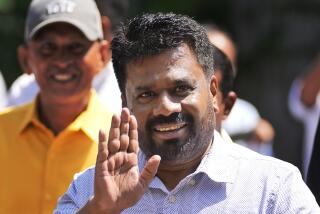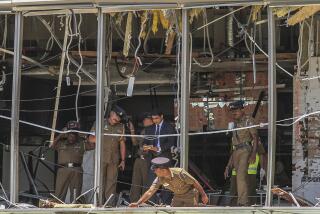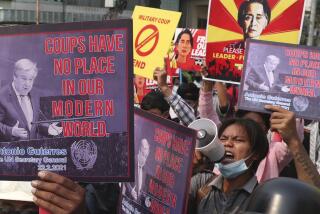Peace at Stake in Sri Lanka
- Share via
Stable democracies are not known for coups d’etat, but the president of the strange hybrid government in the South Asian island nation of Sri Lanka engineered the next-closest thing this month. The maneuvering would have been worthy of comic opera were it not for its threat to derail a peace process aimed at ending a 20-year civil war that has killed more than 60,000 people.
President Chandrika Kumaratunga waited until Prime Minister Ranil Wickremesinghe was in Washington to meet with President Bush before she let her longtime antagonism for Wickremesinghe spiral out of control and threaten her country’s stability. Kumaratunga suspended Parliament, declared emergency rule and fired three Cabinet ministers who she claimed were giving too many concessions to the Tamil Tiger rebels. She soon ended emergency rule, but her quarrel with Wickremesinghe continues.
The damage she caused could be major. The Tigers, which the U.S. rightly labels a terrorist group, broke off peace talks in April but floated a new proposal shortly before Kumaratunga’s imperious gestures. The Tigers then said they would wait for the two leaders to resolve their differences before resuming negotiations.
Worse, Norway, which mediated between the warring factions and was instrumental in forging a cease-fire last year, on Friday agreed that more talks would have to wait until the political infighting ended.
Wickremesinghe runs the government day-to-day, but Kumaratunga, head of an opposition party that lost elections two years ago, commands the armed forces and has the power to dissolve government.
New elections may be required; if so, the best result would be a decisive majority for Wickremesinghe, who campaigned as a peace candidate last time. A convincing win could show Kumaratunga that she has misread the desire of Sri Lankans to end the killings.
Other countries, especially Japan and the U.S., have rightly supported peace talks and pledged money to repair war damage. But Sri Lanka’s problems could spill over its borders again. Early in the war, neighboring India supported the Tamils, who account for about 20% of Sri Lanka’s population and are a sizable ethnic group in India.
When New Delhi ended its aid, a Tamil suicide bomber assassinated Rajiv Gandhi, India’s former prime minister. Kumaratunga and Wickremesinghe, both members of Sri Lanka’s majority Sinhalese ethnic group, need either to work together or leave government and let the peace process resume.
More to Read
Sign up for Essential California
The most important California stories and recommendations in your inbox every morning.
You may occasionally receive promotional content from the Los Angeles Times.













